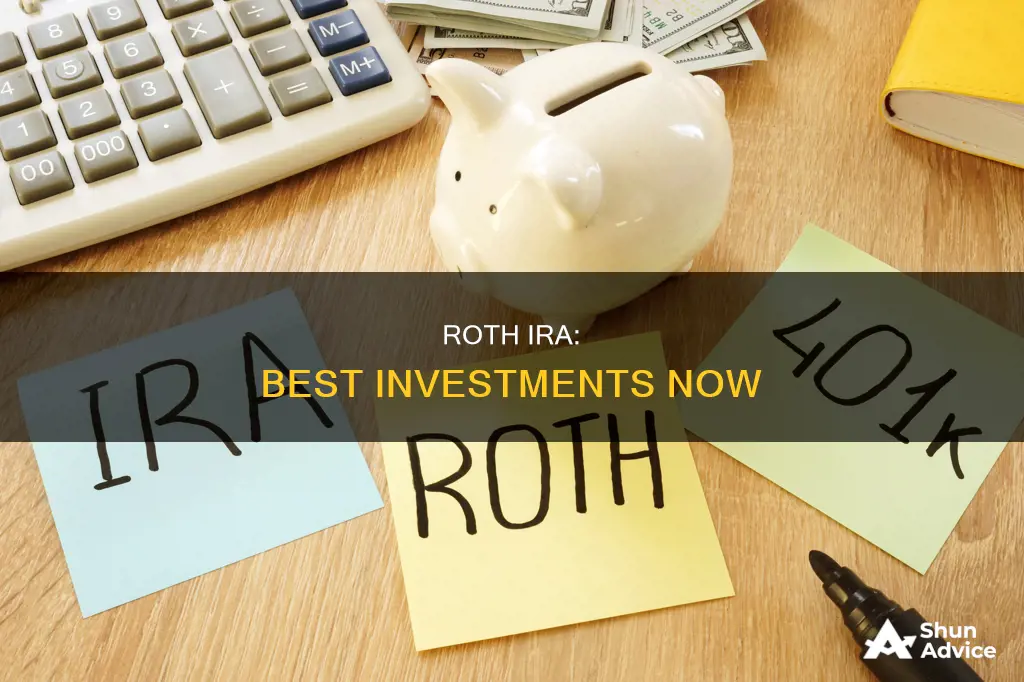
A Roth IRA is a powerful tool for retirement savings. It is a type of tax-advantaged individual retirement account that allows you to grow your money tax-free and make tax-free withdrawals in retirement. With a Roth IRA, you pay taxes on contributions upfront, and your investment returns, income, and dividends grow tax-deferred.
When considering investments for your Roth IRA, it's important to focus on long-term, tax-efficient strategies. Here are some of the best investment options for your Roth IRA right now:
1. S&P 500 Index Funds: These funds track the performance of the Standard & Poor's 500 Index, which includes many of America's top companies. They offer broad diversification, potential for solid gains, and low expense ratios.
2. Dividend Stock Funds: Dividend stocks are offered by mature companies that generate high cash flow and distribute profits to shareholders. Dividend stock funds provide a relatively safe investment with the potential for steady dividend income, which can be reinvested tax-free within the Roth IRA.
3. Value Stock Funds: Value stock funds invest in stocks that are priced lower than their intrinsic value, offering the potential for good returns and dividend income.
4. Nasdaq-100 Index Funds: These funds focus on the largest companies trading on the Nasdaq exchange, including tech giants like Amazon, Apple, and Meta Platforms. They offer high exposure to top tech players and the potential for strong returns.
5. Real Estate Investment Trusts (REITs): REITs are companies that invest in income-producing properties or real estate loans. They are required to distribute at least 90% of their taxable income as dividends, providing high dividend yields. Holding REITs in a Roth IRA can be a tax-efficient strategy.
6. Target-Date Funds: These funds automatically adjust your asset allocation based on your planned retirement date, becoming more conservative as you approach retirement. While they may have higher fees, they offer a hands-off approach to retirement investing.
7. Small-Cap Stock Funds: Funds that invest in small-cap stocks offer the potential for high growth over time. They tend to be riskier but can provide attractive returns within a well-diversified portfolio.
8. Bond Funds: While they may not perform as well as stocks over the long term, bond funds can generate meaningful income that is tax-free within a Roth IRA. Focus on core bond funds with highly-rated bonds to minimize risk.
9. High-Yield Bond Funds: Also known as junk bond funds, these carry higher risks of default but offer the potential for higher returns and dividend yields. They can be suitable for a Roth IRA if you are comfortable with the associated risks.
10. Growth Stocks and Funds: These involve investing in relatively young companies that have the potential for rapid growth but may also stagnate or fail. Growth funds can provide diversification and mitigate risks while still offering strong long-term returns.
| Characteristics | Values |
|---|---|
| Tax efficiency | Tax-free |
| Investment options | Stocks, bonds, mutual funds, exchange-traded funds, money market accounts, certificates of deposit, REITs, cryptocurrencies, etc. |
| Income limits | $146,000 (single filers) or $230,000 (married filing jointly) |
| Contribution limit | $7,000 (under 50) or $8,000 (50 and older) |
| Withdrawal rules | No taxes or penalties if over 59 ½ and the account has been open for at least five years |
What You'll Learn

Mutual funds
Target-date funds adjust their asset allocation over time as you approach retirement. They are a good option for investors who don't want to actively manage their portfolio. While these funds can be more costly than other options, they offer a hassle-free way to maintain a diversified portfolio.
Index funds, such as the S&P 500 index funds, offer a well-diversified portfolio of stocks that track the performance of a specific stock market index. They tend to have low investment fees due to their passive nature. However, it's important to note that while index funds have historically performed well, past performance does not guarantee future results.
Dividend stock funds invest in stocks that provide consistent distributions to their shareholders. The dividends generated by these funds can be reinvested to grow your Roth IRA even further. Dividend stock funds are considered relatively safe because the companies that pay dividends tend to be established and mature.
Growth funds focus on shares of young companies that have the potential for rapid appreciation. However, these funds also come with higher risk, as young companies may stagnate or fail. To mitigate this risk, consider investing in growth-oriented mutual funds that hold a diversified portfolio of stocks across hundreds or thousands of companies.
When choosing mutual funds for your Roth IRA, it's important to consider your investment goals, risk tolerance, and time horizon. It's always a good idea to consult with a financial advisor to determine which specific funds are right for your individual circumstances.
Southwest Airlines: Invest or Avoid?
You may want to see also

Dividend stock funds
Dividend stocks are risky in the sense that owning any individual stock is riskier than owning a diversified portfolio of stocks. But dividend stocks are less risky than growth stocks because the companies are well-established. Some have such a long history of consistent and ever-increasing dividend payments that they're called "dividend aristocrats".
For the lowest ongoing expenses, look for passively managed funds. Active management options charge higher fees than passive management and rarely outperform them.
If you're looking for the best of the best, consider a dividend aristocrat fund.
Litecoin: Worth Your Investment?
You may want to see also

Nasdaq-100 index funds
There are multiple ways to invest in the Nasdaq-100, including exchange-traded funds (ETFs), mutual funds, options, futures, and annuities.
ETFs are a popular choice as they offer the benefits of a diversified portfolio and typically track a pool of assets, such as an index, sector, or commodity. They are also easily traded on stock exchanges. Two examples of ETFs that track the Nasdaq-100 are the Invesco QQQ Trust ETF and the Shelton Nasdaq-100 Index Direct.
Mutual funds are another option for investors seeking a more passive, long-term investment strategy. They are designed to provide diversified exposure and long-term growth while protecting income and assets. Annuities, which can be funded with a lump sum or through regular payments, are also a good option for those seeking guaranteed income after retirement.
Options and futures are more complex and riskier investments, typically suited for more sophisticated investors. Options give investors the choice to buy or sell a security at a specific date and price and are often used for hedging. Futures provide a way to invest in commodities markets and offer protection against swings in tech earnings.
When investing in Nasdaq-100 index funds or any other investment, it is important to consider your financial situation, risk tolerance, and investment goals. It is always recommended to consult with a qualified financial professional before making any investment decisions.
Oregon's Investment Hotspots
You may want to see also

Small-cap stock funds
Small-cap stocks have the potential to grow quickly over time, and they are often high-growth companies. By investing in a fund focused exclusively on small-cap stocks, such as an index fund that tracks the Russell 2000, you can enjoy the relative safety created by the fund's well-diversified portfolio of holdings.
When deciding whether to invest in small-cap stock funds, it is important to consider your risk tolerance and investment timeline. Small-cap stocks tend to be more volatile than large-cap stocks, so they may not be suitable for investors with a low risk tolerance or those nearing retirement age. However, for investors with a long investment horizon and a higher risk tolerance, small-cap stock funds can be a good way to achieve higher returns.
Best Currency Bets: Where to Invest Now
You may want to see also

Real estate investment trusts (REITs)
- Tax advantages: REITs are structured to provide tax benefits. By law, they must distribute at least 90% of their taxable income to shareholders as dividends, which are not taxed within a Roth IRA. This allows your investments to grow tax-free and provides a double advantage for investors.
- Diversification: REITs offer an opportunity to diversify your portfolio by investing in real estate without the need to purchase and manage properties directly. This helps reduce overall portfolio risk and can lead to increased returns.
- High dividends: REITs are known for providing steady and high dividend income, making them attractive for investors seeking regular payouts.
- Strong track record: Historically, REITs have delivered competitive total returns, based on high and steady dividend income, as well as long-term capital appreciation.
- Liquidity: Most REITs are publicly traded on major stock exchanges, making them highly liquid investments. This is especially beneficial when compared to the illiquid nature of direct real estate investments.
- Professional management: Listed REITs are professionally managed, allowing investors to benefit from the expertise of experienced individuals who work to maximize shareholder value.
When considering investing in REITs through a Roth IRA, it's important to keep in mind that REITs can be volatile, especially those concentrated in specific sectors like office buildings or shopping malls. To mitigate this risk, consider investing in REIT exchange-traded funds (ETFs) or mutual funds, which provide broader diversification. Additionally, remember that while REITs offer stable cash flow through dividends, they may offer limited capital appreciation due to the requirement to distribute most of their income.
Overall, REITs can be a valuable component of a well-diversified portfolio, especially when held in a tax-advantaged account like a Roth IRA. They provide access to the real estate market, strong dividend income, and competitive total returns, making them a compelling option for long-term investors.
Mutual Funds: Why Invest?
You may want to see also
Frequently asked questions
Some good investment options for a Roth IRA include stocks, bonds, exchange-traded funds (ETFs), mutual funds, and real estate investment trusts (REITs).
A Roth IRA offers several benefits, including tax-free withdrawals in retirement, no required minimum distributions, and the ability to choose your own investments.
Yes, there are income limits for contributing to a Roth IRA. For 2024, the contribution limit is $7,000 for those under 50 with an income below $146,000 (single filers) or $230,000 (married filing jointly). The limit is $8,000 for those 50 and older.
To open a Roth IRA, you need to figure out your eligibility, decide on the type of investor you are, choose a provider, gather the necessary paperwork, and pick your investments.







